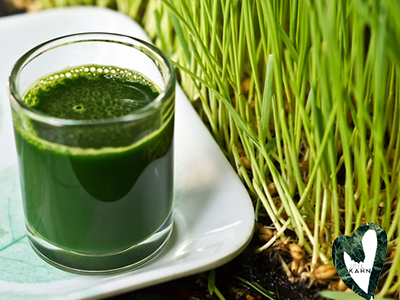
If you walk into most health food stores, juice bars, or restaurants a loud grinding sound can be heard. Regular visitors will recognize this sound as wheat grass being macerated into a shot of bright green juice, usually an ounce or two. For this luxury of turning living grass blades into juice one might pay $2-4/ounce. Fans of wheatgrass juice indicate that an ounce of wheat grass juice has the equivalent nutritional value of eating or juicing 2 pounds of vegetables although this claim has been questioned (http://healthpsych.psy.vanderbilt.edu/WheatGrass.htm). Is there any support that demonstrates a benefit to the “cult” of wheat grass juicing for health?
The story goes that Ann Wigmore used wheat grass juice to help heal herself of cancer and went on to found the Hippocrates Health Institute (http://hippocratesinst.org/wheatgrass-2). I have visited there and people from around the world travel to that site to use a raw food diet with daily wheat grass juice to maintain or better their health. It is impressive sight to see guests cut their own grass, juice it, and drink it all under 10 minutes from the roots being in the soil.
Periodically I have searched for published medical evidence in peer reviewed journals examining the potential health benefits of wheat grass juice and was dismayed not to find too much. Of course, there is no wheatgrass lobby to fund such studies but the interest in wheat grass juice is quite large and well known. It appears that when you search the National Library of Medicine there are some studies to be found if you search wheat grass and not wheatgrass. I am humbled by my error.
I have just become aware of one such study published over a decade ago as “wheat grass,” examining its role in ulcerative colitis (http://www.ncbi.nlm.nih.gov/pubmed/11989836). In this double blind, placebo controlled study (the best type of clinical research in humans), 23 patients with active ulcerative colitis (UC) received 100 cc of wheat grass juice or placebo daily for a month. For the 19 patients that completed the study and had complete information, wheat grass juice was associated with significant reductions in in overall disease activity and severity of rectal bleeding. No serious side effects occurred.
Why might wheat grass juice be of benefit in inflammatory bowel disease like UC? Wheat grass has been shown to have powerful antioxidant activity (http://www.ncbi.nlm.nih.gov/pubmed/16521113) as well as strong anti-inflammatory properties in its abundant component apigenin (http://www.ncbi.nlm.nih.gov/pubmed/17982104). In addition, the high content of chlorophyll, vitamins and minerals may play a role. My suggestion is stop in your local health food store, restaurant or juice bar and see how an ounce of wheat grass (or wheatgrass) settles in your stomach. It is an acquired taste that I now enjoy and am gratified has scientific support for its healing potential.
Originally posted on HuffingtonPost.com

